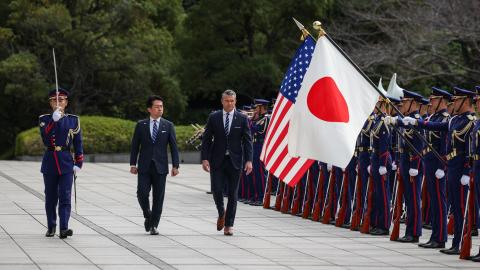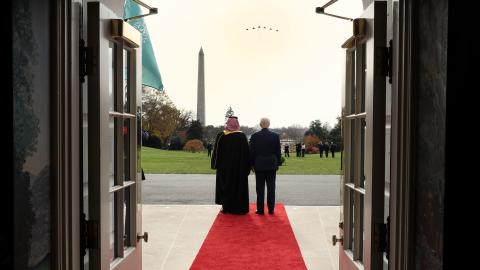Later this week, U.S. Secretary of State Hillary Clinton will visit Hanoi to attend the East Asian Summit, a five-year-old forum that brings together top officials from 16 East and Southeast Asian countries to discuss the future of the region. Clinton is a "special guest" in Hanoi, and her presence at the gathering reflects anticipation that the United States will be invited to join the summit as a permanent member in 2011. As with most diplomatic moves in Asia these days, that prospective invitation is as much about China as it is about the United States, and it speaks to a stark underlying reality for Asia's rising superpower: Beijing's vaunted statesmanship in the region is reaching the point of diminishing returns.
China has successfully convinced its neighbors that it is a legitimate and indispensable rising power in Asia, and that this is on balance a good thing. China was welcomed as a founding member of the ASEAN Regional Forum--the first region-wide multilateral discussion of security issues in Asia--in 1994, and this year joined with neighboring countries in launching a multilateral currency swap arrangement with a foreign exchange reserve pool worth $120 billion. But whether those countries want a dominant China is another matter entirely. The era of picking low-hanging diplomatic fruit is almost over. Beijing's neighbors are beginning to look for ways to hedge against China's rise and even help restrain Beijing's strategic options--and that means that they're looking at the United States' presence in the region with new eyes.
China, in fact, understands this dynamic much better than its Western hemispheric rival; the reality of enduring American strengths and significant Chinese weaknesses is better appreciated in Beijing than in Washington. China knows that American power and influence in Asia is based on two things: its military and economic pre-eminence and Washington's unmatched several-decade record of underwriting peace and prosperity in the region. The vast majority of Asian states welcome the presence of the U.S. Seventh Fleet--critical support, as America's forward deployments depend heavily on their acquiescence and cooperation.
China, by contrast, may be the loneliest rising power in recent history. Other countries in the region may look forward to the economic opportunities presented by China's rise, but Beijing has few genuine or reliable allies. It remains distrusted by almost every maritime power in the region. Domestically, even China's Premier Wen Jiabao recognizes that China is a potentially unstable combination of a strong and rich state ruling over a poor and weak country.
Beijing's lead in forging regional free trade agreements has helped enhance its economic clout. But for China to translate its economic growth and size into political leverage, it will have to become the dominant center of consumption in Asia. For now, in absolute terms, China's domestic consumption is roughly on par with France's. Chinese GDP growth is largely driven by domestically funded fixed investment that frequently offers little or no return--think empty buildings and little-used highways--and exports. About half of China's much-hyped trade within Asia is processing, assembling products destined for American and European markets.
Foreign companies benefit from the ease of setting up manufacturing and assembly plants in China, the country's cheap labor, and its undervalued yuan. But there is also resentment about the fact that millions of manufacturing jobs in the region have been lost to China; Indonesia has voiced concerns that the China-ASEAN Free Trade Agreement, activated in January, will devastate its garment and textiles industries. Until the appetites of Chinese consumers expand enough to create millions of jobs for regional workers, Beijing will find it difficult to extract political and strategic concessions from its neighbors.
Much of the problem has to do with the Chinese Communist Party's entrenched political economy, which holds down domestic consumption by directing economic gains to the few--the state-controlled sector--over the many, the burgeoning private sector. This means that income distribution in China has become the most unequal in all of Asia: While the income of the state-controlled sector has been growing at more than 10 percent a year over the past decade, household incomes have been improving by only 2-3 percent. Chinese state-sector procurement policies also follow rules that favor indigenous companies, making access to the most lucrative sector of the country's economy difficult for regional companies--another grudge for neighbors to hold against the rising power.
Old habits have marred China's diplomatic forays as well. Despite impressive diplomacy over the past decade, Beijing has never given up its claims to disputed maritime territory in the East and South China Seas. Its reported statement that its claims in the latter are part of China's "core interests" is impolitic, but consistent with its long-term strategic ambitions: Beijing's strategy has been to ostensibly commit to the "peaceful resolution" of these issues while refusing to make serious attempts to actually resolve them. The result is widespread suspicion that a rising China is simply biding its time and will move on these contested claims when its political leverage is much more formidable.
While Asian states are generally comfortable with Washington's ongoing role as the preeminent security provider in Asia, they remain fearful that Beijing might well behave less benignly in the role of regional hegemon. Central to the rhetoric and self-image of the modern Communist Party is its claim that China will regain its status as Asia's "Middle Kingdom," the sort of bluntly hierarchical vision of regional geopolitics that neighbors tend not to be thrilled about. During a discussion of the South China Sea issue at a recent ASEAN meeting, Chinese Foreign Minister Yang Liechi lost his temper, declaring that "China is a big country and other countries are small countries, and that is just a fact." It was a chilling reminder to the region that a dominant China might well behave differently than a territorially distant and democratic power such as the United States.
The result is that key regional states are not just hedging against China's rise but subtly bandwagoning with Washington in order to hem in Beijing's strategic options. Inviting the United States to join the East Asian Summit as a permanent member is just one illustration of this strategic dynamic; others include Seoul, Jakarta, and Hanoi eagerly agreeing to strengthen military ties with Washington over the past six months.
Secretary Clinton's upcoming tour of Vietnam, Cambodia, Malaysia, Papua New Guinea, New Zealand, and Australia thus comes at an opportune moment. The United States still needs to commit more manpower and ships to the region, and reassure the region's capitals that unlike China, its grand designs are limited to maintaining stability in Asia. But as the starter, simply showing up can sometimes work wonders.
















